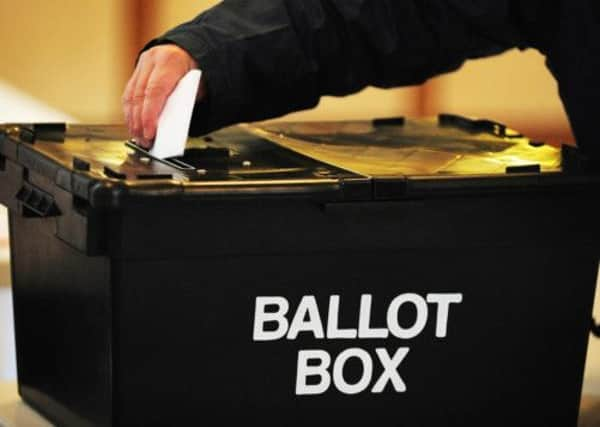Ian McMillan: Voters at cross purposes with the ballot paper


I love the stride into the Polling Station, the taking of the voting slip, the pause with the pencil, the placing of democracy’s kiss on the paper, the folding of the paper, the sound of the paper falling into the ballot box to join all the others. And of course it goes without saying that if you don’t vote you can’t ever complain about any government or council decisions because, literally, you have no say. You’ve gone without saying.
And it’s funny that despite the fact we’re still a forelock-tugging country, in awe of privilege and pomp, we’re still fans of democracy. We give it respect and space; we think that it’s A Good Thing. Apart from the aforementioned Non-Voters, of course, but like I said before, they don’t count. They can’t be counted so they don’t count.
Advertisement
Hide AdAdvertisement
Hide AdLately, though, I’ve started to think that the simple act of voting isn’t subtle enough, doesn’t allow enough room for nuance and disagreement.
Let’s pretend there are two parties contesting an election, the Tables and the Chairs. You’ve always voted for the Tables because, broadly, the views of the Table Party coincide with your views. Occasionally you think someone from the Chair Party has a good idea, but you could never bring yourself to vote for them. You feel instinctively drawn to the Table Party and you feel that voting for the Chairs would be wrong.
And yet, and yet. It’s a shame that when you put your X next to the Table Candidate on the voting paper, you can’t put a different symbol. An X with reservations, perhaps. A Yes, but…X. An X with an asterisk next to it and then at the bottom of the ballot paper, next to another asterisk, a list of the things you’d like to discuss with the candidate. You could put a Y? Or an O! But if you did that, your paper would be marked as spoiled and you may as well not have bothered to rise from the couch.
Of course political parties like the Chairs and Tables contain variations, too. Every political party is full of human beings with their own contradictions and internal arguments. Sometimes you’ll hear somebody’s views and think ‘Well, they’re never a Chair! They’re more towards the Occasional Wing of the Table Party!’ And vice versa. So when you stick your didactic X on the paper you’re taking none of this into account, really; you’re voting for an ideal or a world view rather than for a person in a suit.
Advertisement
Hide AdAdvertisement
Hide AdIn local elections, though, like the ones people are voting in this week, sometimes the party isn’t as important as the person. Voters like Mr X because he helped to campaign to keep their swimming pool open and they’ll vote for Ms Y because her views coincide with theirs even when they don’t always coincide with her party’s views.
That’s why Independents often get in in these kinds of elections because they can be, in the same way that the Liberal Democrats used to be before they got tainted by office, mavericks and free spirits. Until the grinding work of committees and compromise begins.
Then the Independent, the person who got voted in to Keep Our Footpaths Free, has to make decisions about schools and drains and highways. And inevitably the Independent has to side with one party or another.
One solution to all this, of course, is to get more involved. Becoming involved empowers you: it’s like voting all the time, but voting that really seems to take those two slippery concepts of subtlety and nuance into account. But then we’re all busy, we’re all working hard to get through the day-to-day, and getting involved takes time and effort and it takes you away from your family and the settee and the nice cuppa.
Advertisement
Hide AdAdvertisement
Hide AdAs a chap who’s in the public eye, I’m often asked to get involved with all kinds of things and sometimes I do, for a little while, and then the rest of my life takes over and, guiltily, I slip away. Until they ask me again. And my life takes over again.
So maybe that’s why we vote, and maybe that’s why the vote is a kind of blunt weapon of mass involvement. We vote because we want people who think a bit like us to make decisions in the kind of way that we would make them if we were in charge; sometimes we might disagree with some of those decisions but we haven’t got the time to make too much of a song and dance about it.
It’s an imperfect instrument, democracy, but it still plays the most beautiful tunes; big tunes without delicacy, but beautiful tunes nevertheless. And what’s the alternative? Don’t vote and one day you might find out.